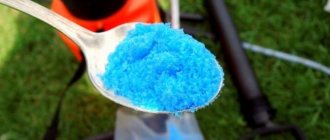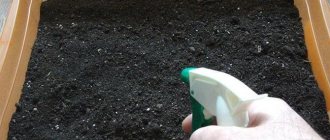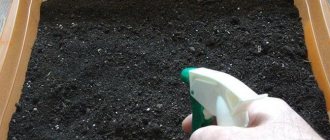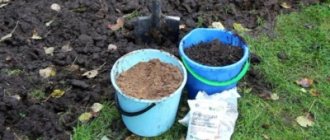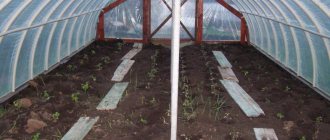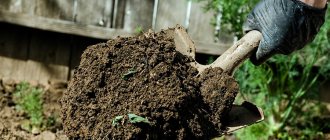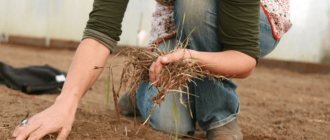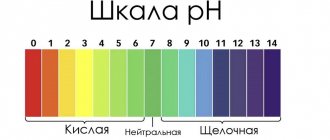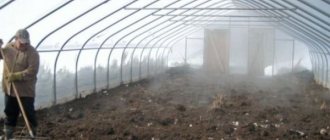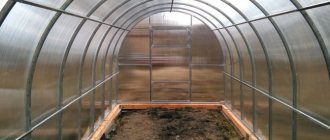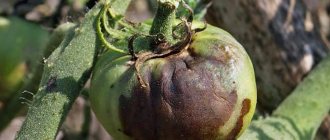Photo: design-homes.ru Everyone knows that plants need to be fertilized, but the knowledge that the soil needs to be disinfected before planting usually comes with experience. But it is the quality and composition of the soil that directly affects flowering and harvest. Over the course of a year, ideal conditions for the life of bacteria and microorganisms are formed in it, and not all of them are beneficial. We'll tell you what and how to solve the problem!
Why disinfect the soil?
If disinfection is neglected, pathogens, fungi, mold, nematodes and other parasites actively multiply in the soil. The seedlings take root with difficulty, and the future harvest will be meager and poor. In disinfected soil, weeds grow less and pests breed less easily, so you can reduce the number of treatments in the future. Seedlings absorb nutrients better, grow faster and healthier.
Photo: boicotpreventiu.org
Content
- Why is pre-planting soil disinfection carried out?
- Methods and preparations for preparing the soil before sowing seeds and planting seedlings
- Method No. 1 “Folk wisdom”
- a) Freezing
- b) Thermal method (high temperature)
- Method number 2. Chemical soil treatment
- a) Use of insecticides
- b) Soil oxidation with potassium permanganate (potassium permanganate)
- Method number 3. Biological soil disinfection
- Recommendations and conclusions
Soil disinfection at the stage of growing seedlings is a very important stage of agricultural technology, since high-quality and disinfected soil is the basis for obtaining strong and healthy seedlings, and as a result, a high-quality harvest.
In this material we will consider means and methods, as well as preparations for disinfecting the soil before sowing seeds and planting seedlings.
The best time for disinfection
You need to monitor the condition of the soil all year long, but it will only be possible to truly process it comprehensively in the spring, when the soil is already warming up, but there is still a minimum of planting in it. This way you can safely apply special antiseptics and not worry that they will destroy the seedlings. Just wait until the snow finally melts.
Photo: pxhere.com
Candy apple tree: variety description, care and planting
Etching
The easiest way to pre-sow the soil to disinfect it is to spill the soil with a solution of potassium permanganate, Fitosporin or the drug Baikal-EM.
How to treat the soil for seedlings with such solutions:
- Potassium permanganate is diluted to form a pink solution. They water the soil mixture. However, it will not be possible to completely disinfect the substrate with potassium permanganate, since its solution has no effect on the majority of pathogens.
- A more effective means for treating soil for seedlings is Fitosorin solution. After its use, the plants will be protected from fungal diseases. Fitosporin is a safe fungicide, which is why it is widely used among summer residents. The solution from the drug must be prepared in advance, following the instructions. It is recommended to prepare it 2-12 hours before use (depending on the type of drug). During this time, beneficial bacteria will multiply in the solution. Ready-made Fitosporin is poured onto the soil intended for growing seedlings. In another day you can start sowing.
- Baikal EM-1 disinfects the soil due to the fact that after watering with a solution, beneficial bacteria actively develop in the soil. They suppress pathogenic flora, and the soil becomes “healthy”. However, you need to know that this process takes about 2-3 weeks.
If you will not be sowing after treating the soil for seedlings, store it in a tight sterile bag. Otherwise, pathogenic microorganisms will again appear in it.
You will be interested to know: Pre-sowing treatment of seeds for disinfection and germination in hydrogen peroxide
Folk remedies
These methods are simple, effective and environmentally friendly, making them ideal for starting seeds in most cases. Temperature treatment implies that you need to act on the soil directly, but directly on the site this is problematic. But planting green manure is suitable for preparing beds.
Freezing
Wrap the soil in a bag made of natural breathable fabric and take it outside in the cold (from -10 degrees) or put it in the freezer for 5 days. After this, put it in a warm place for a week so that all pests and larvae become active, and repeat the procedure at least twice.
Photo: soulandlifecoaching.com
Calcination
Sprinkle the soil onto a baking sheet in a layer up to 1.5 cm thick and distribute evenly. Moisten it a little with a spray bottle and put it in the oven for half an hour, preheated to 80-90 degrees. Do not increase the temperature because the soil will become unsuitable for seedlings.
Photo: teplica-exp.ru
Steaming
Place natural breathable fabric in a colander, pour soil on top and place in a boiling pan in a water bath. The soil should be steamed for about an hour and a half, but this is still a more gentle option than the oven. Stir it every quarter of an hour to ensure even processing.
Photo: asienda.ru
Green manure plants
Some plants have a beneficial effect on the structure and composition of the soil. The so-called green manures are planted in early spring, before the main crops. Your seeds germinate in containers, while legumes, mustard, oats, rye and radishes prepare the soil. Before planting green manure seedlings, you need to completely cut off and dig up the top layer right with the roots.
Photo: vapeshop77.ru
What pests live in the upper layers of soil and fallen leaves
Here may be:
- strawberry and spider mite deposits;
- cruciferous flea beetle;
- various weevils;
- mole cricket;
- wireworm;
- Colorado beetle;
- May beetle larvae and many others.
Theoretically, to get rid of such pests in the fall, and, of course, pathogens, it is necessary to clean up fallen leaves, tops, and remnants of used mulch. In such cases, it is recommended to burn such garbage, although many gardeners are sure that they will not survive in a rotting compost pit either.
Chemicals
There are many special products that destroy weeds, infections and pathogens as quickly and efficiently as possible. But the more effective the drug, the more toxic it is, so you need to use them strictly before planting.
Copper sulfate
One of the most effective preparations in gardening and gardening is copper sulfate. It is needed to combat fungus, mold, for general antiseptic treatment and as a supplement for copper deficiency. Dissolve a spoonful of powder in a bucket of water and water the soil when the snow melts.
Photo: sanpros.ru
Bordeaux mixture
The most popular garden remedy for all ills also contains slaked lime. This is a very effective fungicide and a surefire way to kill any bacteria. Bordeaux mixture is also suitable for treating already planted plants.
Photo: postroitbanju.ru
Potassium permangantsovka
Potassium permanganate is a universal antiseptic that is equally suitable for treating seeds and disinfecting soil. Prepare a weak pink solution of about 3-5 g per bucket of water. This recipe is better suited for alkaline and neutral soils, because acidic ones can oxidize even more.
Photo: 2sotki.ru
Bleaching powder
This is the most radical remedy if the soil is already in very poor condition. Protective clothing, gloves, a respirator, goggles and other protective equipment are required. About 200 g of powder should be thoroughly dug up with soil and left to rest.
Photo: novoe-mesto.ru
Fungicides and insecticides
Bacterial-type preparations consist of microorganisms that destroy pathogens and strengthen the immunity of seedlings. Choose complex action products and combine them with insecticides to kill pests in the soil. The optimal time is three weeks before planting.
Photo: bashmakovo.pnzreg.ru
Lupine (70 photos): types and features of care
Common mistakes
- High temperature during heat treatment.
You cannot exceed the value of 90 degrees and the time of 20-30 minutes if you do not want to destroy the substrate for the seedlings. - After calcination and freezing, the soil is not renewed with nutrients.
If you choose a thermal method to disinfect the soil, then be sure to treat it with biological agents to restore its fertility. - Using large amounts of copper sulfate.
Copper in large quantities harms plants, so precautions must be taken when preparing the working solution. - Mixing chemicals and biologically active substances.
“Chemistry” will kill not only pathogens, but also beneficial bacteria. As a result, the land will be infertile. - Use of land that has already been used.
Along with errors in the use of disinfection methods, a summer resident often tries to save money and uses soil for seedlings that has already been used under plants. This cannot be done not only because the land may be contaminated, but also because it will no longer be so fertile.
Disinfection of soil in a greenhouse
Although the greenhouse is partially isolated from the outside world, the soil in it needs to be treated in the same way. After all, a warm, humid greenhouse is better suited for pathogens than the street with its temperature fluctuations. We recommend cultivating the soil in the greenhouse twice a year, and periodically changing it completely as it becomes depleted.
Photo: bb.lv
Disinfection of containers for planting
If you use last year’s containers for sowing and replanting, which you have already used for the same purposes, then it is highly recommended to disinfect them. This can be done, for example, using a solution of the same pharmacy hydrogen peroxide! Dilute 2-3 bottles (standard volume 100 ml) of pharmaceutical peroxide in a 1:1 ratio with warm tap water. Wash the containers thoroughly with this solution, then rinse them with clean water. Processing should only be carried out with protective gloves!
Help: Hydrogen peroxide has a universal antimicrobial effect. Gram-positive and gram-negative bacteria, viruses, and many types of pathogenic fungi are sensitive to it. Causes the death of spores of most sporogenic bacteria.
Photo: disinfection of containers for sowing
Which primers can be considered “proven Universal primers” in green bags, sold in Leroy Merlin. If the technology described above is followed - aeration, mixing, disinfection with peroxide, etc. this soil gives good results.
Photo: samples of soil packaging
Disinfection of soil for seedlings
Weak young shoots are very sensitive to all external factors, so any bacteria and weeds in the soil affect germination. In this case, home methods - calcination, steaming or freezing - are sufficient. Or use ready-made store-bought mixtures that have already been processed.
Photo: okwedding.ru
Aphids on currants: how to fight, what to treat
Answers to frequently asked questions
Is it necessary to disinfect purchased substrate?
Preferably. In general, the manufacturer guarantees that the soil has been completely disinfected at the factory. But sometimes it’s better to be safe than sorry.
What is the most effective way to disinfect soil?
Some types of fungi are able to survive in the cold. But the probability of infection of purchased land with such disputes is very low.
If you decide to disinfect a purchased substrate, you can use any method.
It is better to calcinate garden soil in the oven and water it with antifungal compounds.
Do I need to use several methods or will just one be enough?
In general, one cultivation of the land for seedlings will be enough.
Soil treatment after disinfection
The soil is almost sterile after serious processing, such as calcination, so you need to add some beneficial microflora. Especially soil in boxes and containers, which has no contact with the outside world. Apply biofungicides two weeks before sowing seeds or planting seedlings.
Photo: mynadache.ru
How to process and with what after different crops
Various vegetable and berry crops leave behind pathogenic microflora. Therefore, the soil is treated before new planting.
- After tomatoes, peppers and eggplants - copper sulfate, Trichodermin, Fitosporin.
- After potatoes – Fitosporin.
- After cucumbers, pumpkins and zucchini - Fitosporin, boric acid.
ON A NOTE.
You can also plant green manure; they not only suppress the development of pathogenic microflora, but also have a beneficial effect on the soil.
Reduced acidity after disinfection
Many antiseptics are quite strong oxidizing agents, so after using them it is worth checking the acidity of the soil. Otherwise, even in sterile soil, seedlings may suffer from fungus and rot. Ash, chalk, dolomite flour, and slaked lime are suitable for deoxidation.
Photo: raznyecvety.ru
Did you like the post? Subscribe to our channel in Yandex.Zen, it really helps us in our development!
Soil selection
This is a responsible event, which is based on successful gardening. Ready-made soil can be bought in stores. It is worth taking into account the opinion of those who have been engaged in various plantings for many years: both indoor plants and agricultural crops.
The supply market is rich and varied. Unfortunately, not all primers are conscientious about the quality of their products. The substrate from the store can not only be “empty” in terms of nutrition for plants, but also have various diseases.
When collecting soil from the garden for seedlings at home, keep in mind that diseases and infections of crops that previously grew in this land can be transmitted to new crops.
Improper agricultural practices can cause fungal diseases. The earth can be a carrier of diseases of other crops, even from which you have already gotten rid of. Garden soil needs to be treated and nourished before planting seeds and at all stages of the plant growing season.
Substrates taken from forests, meadows, and parks are varied in composition. In addition to the nutritional resource, they have their own microflora, the presence of living organisms and microbes.
Do not take land near highways and industries. In addition to the bouquet of unfavorable pathogenic flora, you will receive heavy metals and other chemicals in the substrate.
Important! Any soil needs to be disinfected and prepared if you want to save yourself from unnecessary problems and troubles when growing and breeding plants.
